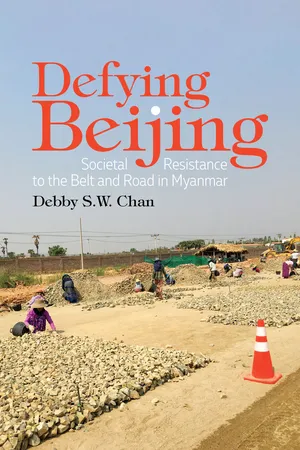
Defying Beijing
Societal Resistance to the Belt and Road in Myanmar
Debby Chan
- 296 pages
- English
- PDF
- Available on iOS & Android
Defying Beijing
Societal Resistance to the Belt and Road in Myanmar
Debby Chan
About This Book
The Belt and Road Initiative (BRI) aims to construct a Sino-centric transcontinental infrastructure network in Asia, Europe, Africa and beyond. Within this initiative, the China–Myanmar Economic Corridor (CMEC) is a vital strategic component. The shortcut to the Indian Ocean seeks to improve China's energy security and facilitate trade. Defying Beijing: Societal Resistance to the Belt and Road in Myanmar shows how Myanmar was able to capitalise on Chinese BRI ambitions to achieve its own desired outcomes during the country's political liberalisation in the 2010s. Belying the asymmetrical relationship between these two nations, the Myitsone hydropower dam was suspended, the Letpadaung copper mine's contract was renegotiated, and the Kyaukphyu deep seaport project was downsized. China offered concessions to Myanmar instead of pressuring it to honour those signed agreements. Contrasting a common proposition that US-Myanmar rapprochement disrupted the BRI projects in Myanmar, Defying Beijing argues that the rise of new foreign policy actors – citizens – made project continuation costlier for Naypyidaw in the course of political liberalisation in the 2010s. Naypyidaw was pressured to renegotiate terms with Beijing in the wake of social outcry in the country. Defying Beijing advances our understanding of Chinese–Myanmar BRI relations and demonstrates how citizens can change the course of events of BRI cooperation despite oppressive political environments and an imbalanced bargaining structure. In post-coup Myanmar, Naypyidaw's policy options were not conditioned by public opinion or protests; nonetheless, armed resistance has posed new domestic constraints in the CMEC's implementation. Clearly, bilateral economic agreements without citizens' endorsement are fraught with legitimacy problems and instabilities.
Frequently asked questions
Information
Table of contents
- Acknowledgements
- Introduction: Pushing Back State-Coordinated Belt and Road Projects in Myanmar
- 1. Myanmar’s Societal Actors in Paukphaw Relations
- 2. Audience Cost Dilemma in Sino–Myanmar Economic Cooperation
- 3. Myitsone Dam: Social Opposition Became Naypyidaw’s Bargaining Leverage
- 4. Letpadaung Copper Mine: Protest Repression in Exchange for Profit Redistribution
- 5. China–Myanmar Pipelines: Business Operated as Usual with Weak Opposition
- 6. Belt and Road Projects’ Implementation under the Aung San Suu Kyi-Led Government
- 7. Conclusion
- Appendix: List of Interviewees
- References
- Index